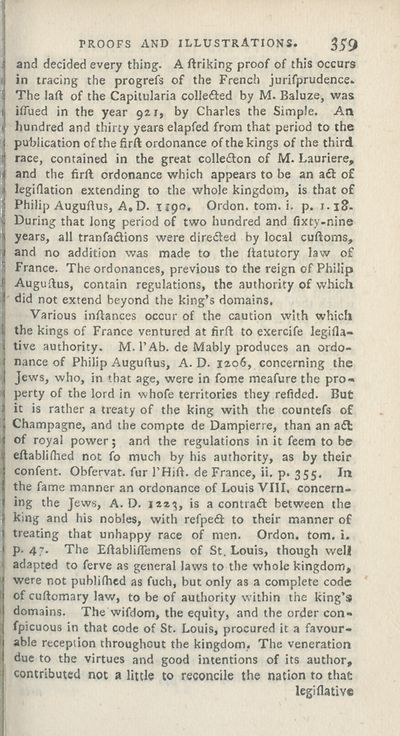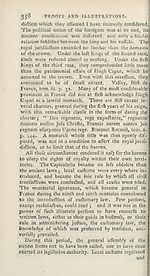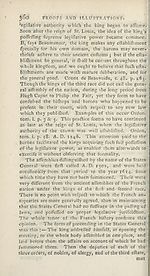Download files
Complete book:
Individual page:
Thumbnail gallery: Grid view | List view

PROOFS AND ILLUSTRATIONS. 35^
Iand decided every thing. A ftriking proof of this occurs
in tracing the progrefs of the French jurifprudence.
^ The laft of the Capitularia collefted by M. Baluze, was
Iiflued in the year gar, by Charles the Simple. An
hundred and thirty years elapfed from that period to the
publication of the firft ordonance of the kings of the third
{ race, contained in the great colledton of M. Lauriere,
and the firft ordonance which appears to be an act of
I legifiation extending to the whole kingdom, is that of
J Philip Auguftus, A. D. 1190, Ordon. tom. i. p. 1.18.
■ During that long period of two hundred and fixty-nine
| years, all tranfaftions were directed by local cuftoms,
|i and no addition was made to the ftatutcry law of
I France. The ordonances, previous to the reign of Philip
) Auguftus, contain regulations, the authority of which
did not extend beyond the king’s domains.
I Various inftances occur of the caution with which
the kings of France ventured at firft to exercife legifla-
tive authority. M. 1’Ab. de Mably produces an ordo¬
nance of Philip Auguftus, A. D. 1206, concerning the
Jews, who, in that age, were in fome meafure the pro¬
perty of the lord in whofe territories they refided. But
it is rather a treaty of the king with the countefs of
Champagne, and the compte de Dampierre, than an adl
of royal power; and the regulations in it feem to be
eftablifhed not fo much by his authority, as by their
confent. Obfervat. fur 1’Hift. de France, ii. p. 355. In
the fame manner an ordonance of Louis VIII. concern¬
ing the Jews, A. D. 1223, is a contradl between the
king and his nobles, with refpeft to their manner of
treating that unhappy race of men. Ordon. tom. i.
p. 47. The Eftabliffemens of St. Louis, though well
adapted to ferve as general laws to the whole kingdom,
were not publifhed as fuch, but only as a complete code
of cuftomary law, to be of authority within the king’s
domains. The wifdom, the equity, and the order con-
fpicuous in that code of St. Louis, procured it a favour¬
able reception throughout the kingdom. The veneration
due to the virtues and good intentions of its author,
contributed not a little to reconcile the nation to that
legiflative
Iand decided every thing. A ftriking proof of this occurs
in tracing the progrefs of the French jurifprudence.
^ The laft of the Capitularia collefted by M. Baluze, was
Iiflued in the year gar, by Charles the Simple. An
hundred and thirty years elapfed from that period to the
publication of the firft ordonance of the kings of the third
{ race, contained in the great colledton of M. Lauriere,
and the firft ordonance which appears to be an act of
I legifiation extending to the whole kingdom, is that of
J Philip Auguftus, A. D. 1190, Ordon. tom. i. p. 1.18.
■ During that long period of two hundred and fixty-nine
| years, all tranfaftions were directed by local cuftoms,
|i and no addition was made to the ftatutcry law of
I France. The ordonances, previous to the reign of Philip
) Auguftus, contain regulations, the authority of which
did not extend beyond the king’s domains.
I Various inftances occur of the caution with which
the kings of France ventured at firft to exercife legifla-
tive authority. M. 1’Ab. de Mably produces an ordo¬
nance of Philip Auguftus, A. D. 1206, concerning the
Jews, who, in that age, were in fome meafure the pro¬
perty of the lord in whofe territories they refided. But
it is rather a treaty of the king with the countefs of
Champagne, and the compte de Dampierre, than an adl
of royal power; and the regulations in it feem to be
eftablifhed not fo much by his authority, as by their
confent. Obfervat. fur 1’Hift. de France, ii. p. 355. In
the fame manner an ordonance of Louis VIII. concern¬
ing the Jews, A. D. 1223, is a contradl between the
king and his nobles, with refpeft to their manner of
treating that unhappy race of men. Ordon. tom. i.
p. 47. The Eftabliffemens of St. Louis, though well
adapted to ferve as general laws to the whole kingdom,
were not publifhed as fuch, but only as a complete code
of cuftomary law, to be of authority within the king’s
domains. The wifdom, the equity, and the order con-
fpicuous in that code of St. Louis, procured it a favour¬
able reception throughout the kingdom. The veneration
due to the virtues and good intentions of its author,
contributed not a little to reconcile the nation to that
legiflative
Set display mode to:
![]() Universal Viewer |
Universal Viewer | ![]() Mirador |
Large image | Transcription
Mirador |
Large image | Transcription
| Antiquarian books of Scotland > Kings & rulers > History of the reign of the Emperor Charles V. > Volume 1 > (377) |
|---|
| Permanent URL | https://digital.nls.uk/109186855 |
|---|
| Description | By William Robertson. London : Cadell and Davies, 1798. |
|---|---|
| Shelfmark | ABS.1.76.13 |
| Additional NLS resources: | |
| Description | Thousands of printed books from the Antiquarian Books of Scotland collection which dates from 1641 to the 1980s. The collection consists of 14,800 books which were published in Scotland or have a Scottish connection, e.g. through the author, printer or owner. Subjects covered include sport, education, diseases, adventure, occupations, Jacobites, politics and religion. Among the 29 languages represented are English, Gaelic, Italian, French, Russian and Swedish. |
|---|

